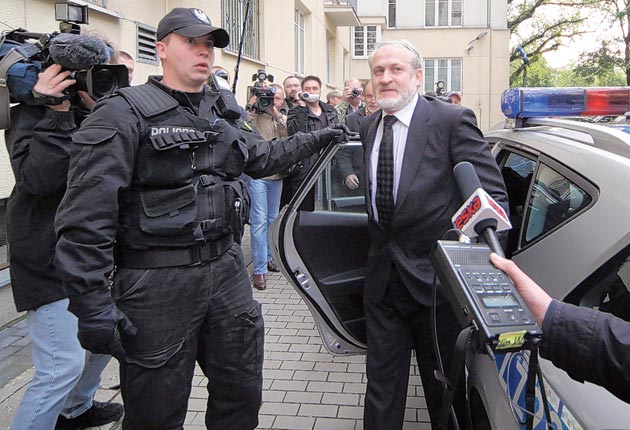Chechen exile detained in Warsaw accuses Poland of betrayal
They have turned their backs on us, says leader wanted by Russia

Akhmed Zakayev, the Chechen leader living in exile in Britain, was arrested yesterday in Poland as he attended a meeting of Chechen exiles from across the world. Mr Zakayev is one of the most wanted men in Russia, where he is accused of involvement in kidnapping and terrorism, and Moscow has made several unsuccessful attempts to have him extradited.
A battlefield commander in the two Chechen wars in the 1990s, he was detained as he made his way voluntarily to the Polish prosecutor's office for questioning. He claims the charges against him are trumped up and said before his arrest that he had gone to Warsaw "absolutely legally" and would not be hiding from the authorities.
"Poland is a democratic and sovereign country. When I learned there would be no trouble, I just came," he said. Polish authorities said they were acting on an international arrest warrant issued by Interpol.
Russia's chief prosecutor, Yury Chaika, said that material supporting the extradition request had been forwarded to Warsaw yesterday. He insisted that Mr Zakayev would face a fair trial in Russia. The former actor was granted political asylum by the UK in 2003 after a judge ruled that he would not get a fair trial in Russia.
"It hadn't crossed our minds that we should abandon this enterprise [the congress] and that the Poles, who have always supported us, would turn their backs on us," Mr Zakayev told the Polish newspaper Rzeczpospolita.
Poland has always been seen as a safe haven for Chechen refugees and exiles and the decision of authorities there to carry out the arrest came as a surprise. But relations between Moscow and Warsaw have thawed in recent months. Polish officials said the decision whether to extradite the 51-year-old would be taken independently of political concerns. "We will not be trying to meet anybody's expectations," insisted Prime Minister Donald Tusk.
In 2002, Mr Zakayev was arrested by Danish police while in Copenhagen for a similar congress of Chechen exiles. That came just after the Nord-Ost theatre siege, when a group of suicide bombers took hundreds hostage in a Moscow theatre. The Russian authorities accused Mr Zakayev of helping to plan the attack, which he denied. He was released by the Danes after a month in custody.
Since being granted asylum in Britain he has fought off a number of extradition attempts from the Russians. He is one of several Russian exiles living in Britain – most of the others are businessmen – whom Moscow wants to see tried in a Russian court.
During the late Soviet period Mr Zakayev worked as an actor in Grozny, the Chechen capital. When war broke out in the 1990s, he became a field commander for the rebel forces who were fighting the Russian Army for independence. Later, he led peace negotiations with the Russians that brought Chechnya de facto independence for a few years; he was also made deputy prime minister.
When the Second Chechen War began in 1999, Mr Zakayev took to the battlefield again. In early 2002 he moved to the UK, where he won support from the actress Vanessa Redgrave.
There have been persistent rumours that Mr Zakayev might return to Chechnya and strike a deal with Ramzan Kadyrov, Chechnya's Kremlin-backed leader. Mr Kadyrov is himself a former rebel, and has been accused by human rights groups of presiding over widespread rights abuses and torture, which he denies. Mr Kadyrov has said in the past that Mr Zakayev would be welcomed back to Chechnya, while officials in Moscow have hinted that a deal could be made whereby charges were dropped. Yesterday, however, Mr Kadyrov said that Mr Zakayev should be tried in Russia and given a life sentence.
In an interview with The Independent in London last year, Mr Zakayev claimed he often met representatives sent "directly from [Russian Prime Minister Vladimir] Putin", but that the discussions focused on refugee issues and an amnesty for those who fought during the Chechen wars. He insisted the issue of his return was not up for discussion while the current power setup remained in place in Grozny, but refused to rule out a return completely.
Mr Zakayev has also drawn threats from the current Chechen resistance. He represents an earlier, more secular and nationalist drive for independence, whereas today's insurgents use more radical Islamist rhetoric. Doku Umarov, the self-appointed Emir of the Caucasus, has even issued a fatwa against Mr Zakayev, accusing him of betraying the ideals of the resistance.
Join our commenting forum
Join thought-provoking conversations, follow other Independent readers and see their replies
Comments
Bookmark popover
Removed from bookmarks